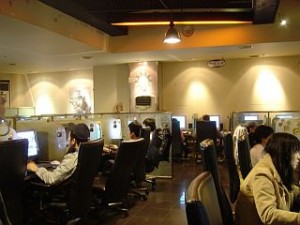
Computer use is growing exponentially
A new series has begun over at Guardian.co.uk’s Technology which asks the question: Do computers make us more human? The series will be continuing with answers from various people over the coming days and it is definitely something worth reading.
The question is certainly one that lies at the core of the social media boom. Before, computers were a means to more productive industry and efficient business practices. They were ways for us to unwind and relax by playing games, a means to try and fulfill some of our dreams of becoming authors, film-makers, or musicians. But now that the computer lies quite literally at the center of many of our lives we really do need to ask the big questions about how it affects us as humans, and how the technology will continue to change just what it means to be part of a human society. It is undeniable that one of the greatest impacts on human social evolution has been the evolution of mass, global, communication networks – and the computer is the technology that brought this to fruition in any meaningful way.
So what do you think? Has this transition into ownership of virtual identity (and often identities plural) been an overall positive influence? Surely there are many negatives to be found as well, but how do these weigh up to what we see as an overarching benefit to humanity? After-all, the computer has become so ubiquitous that we now see it as a symbol of the developed world. There are charities dedicated to bringing computer technology to impoverished communities around the globe – but is this where the money and efforts are best spent? Will such initiatives make much of an impact on these communities? Or are we simply projecting our own sense of virtual value onto societies that may not necessarily need to hold these things in such esteem?
Obviously I personally consider the computer to be a true boon to society’s development – the existence of this blog and its intended purpose kind of helps illustrate this point! Now, unlike any other time in human history, almost all of us have a voice. Although many argue against the noise and inane chatter that may fill much of the internet, the fact remains that those who have something important to say now have a very low barrier in order to be able to do so. If a major component of being human is that we are social animals – then the computer is enabling us to be more human then ever before; to forge networks and relationships that were previously not even imaginable. The social landscape is changing by such degree that we are having to create new language to discuss these concepts. In my eyes, computers emphasise everything that is most human about us, and make it clear just how social we are at the very core of our being. It is true that this situation could be improved even further, particularly in the developing communities mentioned earlier, but such improvements do seem to be coming hard and fast. In many of the most developed countries around the world there are government initiatives to ensure that every single individual has access to the internet and a computer in one form or another.
There are concerns and discussions to be had about the implications of government data-mining and other forms of Big Brother-esque outcomes – but the point is that the computer and the global communications networks that come as a result allow us to do just this. Without them, these conversations and debates cannot happen. This is why many countries that are concerned about stifling public opinion and possible dissent are so paranoid about the manner in which computers are used, and particularly the way in which we interface with each other through the internet. It isn’t just about the information we can access through such channels, it is about the fact that we can be granted a voice – that social injustice and unrest can be broadcast to such a wide audience within mere moments.
Let us know what you think in the comments, and make sure to check out the ongoing answers connected to the Guardian.co.uk article. I, for one, am wholeheartedly embracing the computer as being at the forefront of the new global, social, and human evolution that is taking place – which is also the reason why I feel there is a need for a dedicated forum to discuss the implications of our progress towards future states of being. What is right? What is wrong? Who decides? Things are changing at such a rapid pace now that if we do not start to come to these conclusions we may end up in some very negative situations indeed.




